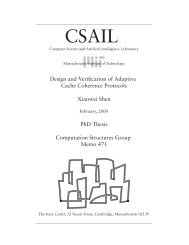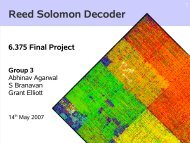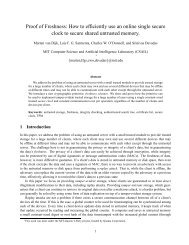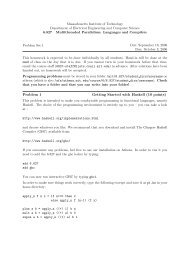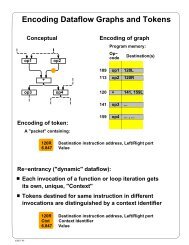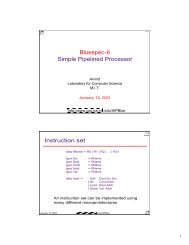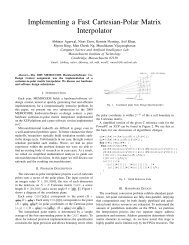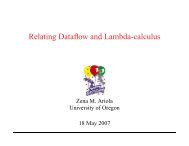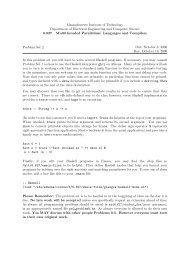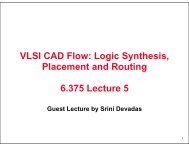Folded Combinational Circuits as an example of Sequential Circuits ...
Folded Combinational Circuits as an example of Sequential Circuits ...
Folded Combinational Circuits as an example of Sequential Circuits ...
You also want an ePaper? Increase the reach of your titles
YUMPU automatically turns print PDFs into web optimized ePapers that Google loves.
<strong>Combinational</strong> 32-bit multiply<br />
function Bit#(64) mul32(Bit#(32) a, Bit#(32) b);<br />
Bit#(32) prod = 0;<br />
Bit#(32) tp = 0;<br />
for(Integer i = 0; i < 32; i = i+1)<br />
begin<br />
let m = (a[i]==0)? 0 : b;<br />
let sum = add32(m,tp,0);<br />
prod[i] = sum[0];<br />
tp = truncateLSB(sum);<br />
end<br />
return {tp,prod};<br />
endfunction<br />
<strong>Combinational</strong><br />
circuit uses 31<br />
add32 circuits<br />
February 19, 2013 http://csg.csail.mit.edu/6.375 L04-3<br />
Design issues with<br />
combinational multiply<br />
Lot <strong>of</strong> hardware<br />
32-bit multiply uses 31 add32 circuits<br />
Long chains <strong>of</strong> gates<br />
32-bit ripple carry adder h<strong>as</strong> a 31-long<br />
chain <strong>of</strong> gates<br />
32-bit multiply h<strong>as</strong> 31 ripple carry adders in<br />
sequence!<br />
The speed <strong>of</strong> a combinational circuit is<br />
determined by its longest input-to-output<br />
path<br />
C<strong>an</strong> we do better?<br />
February 19, 2013 http://csg.csail.mit.edu/6.375 L04-4<br />
2



